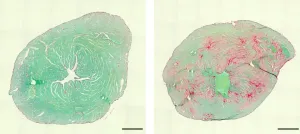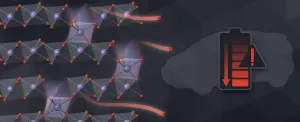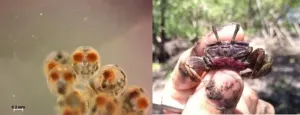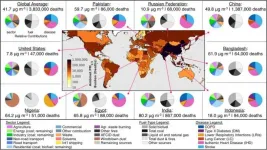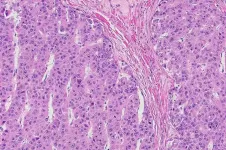Dark matter is slowing the spin of the Milky Way's galactic bar
The spin of the Milky Way's galactic bar, which is made up of billions of clustered stars, has slowed by about a quarter since its formation, according to a new study by researchers at University College London and the University of Oxford
2021-06-14
(Press-News.org) The spin of the Milky Way's galactic bar, which is made up of billions of clustered stars, has slowed by about a quarter since its formation, according to a new study by researchers at University College London (UCL) and the University of Oxford.
For 30 years, astrophysicists have predicted such a slowdown, but this is the first time it has been measured.
The researchers say it gives a new type of insight into the nature of dark matter, which acts like a counterweight slowing the spin.
In the study, published in the Monthly Notices of the Royal Astronomical Society, researchers analysed Gaia space telescope observations of a large group of stars, the Hercules stream, which are in resonance with the bar - that is, they revolve around the galaxy at the same rate as the bar's spin.
These stars are gravitationally trapped by the spinning bar. The same phenomenon occurs with Jupiter's Trojan and Greek asteroids, which orbit Jupiter's Lagrange points (ahead and behind Jupiter). If the bar's spin slows down, these stars would be expected to move further out in the galaxy, keeping their orbital period matched to that of the bar's spin.
The researchers found that the stars in the stream carry a chemical fingerprint - they are richer in heavier elements (called metals in astronomy), proving that they have travelled away from the galactic centre, where stars and star-forming gas are about 10 times as rich in metals compared to the outer galaxy.
Using this data, the team inferred that the bar - made up of billions of stars and trillions of solar masses - had slowed down its spin by at least 24% since it first formed.
Co-author Dr Ralph Schoenrich (UCL Physics & Astronomy) said: "Astrophysicists have long suspected that the spinning bar at the centre of our galaxy is slowing down, but we have found the first evidence of this happening.
"The counterweight slowing this spin must be dark matter. Until now, we have only been able to infer dark matter by mapping the gravitational potential of galaxies and subtracting the contribution from visible matter.
"Our research provides a new type of measurement of dark matter - not of its gravitational energy, but of its inertial mass (the dynamical response), which slows the bar's spin."
Co-author and PhD student Rimpei Chiba, of the University of Oxford, said: "Our finding offers a fascinating perspective for constraining the nature of dark matter, as different models will change this inertial pull on the galactic bar.
"Our finding also poses a major problem for alternative gravity theories - as they lack dark matter in the halo, they predict no, or significantly too little slowing of the bar."
The Milky Way, like other galaxies, is thought to be embedded in a 'halo' of dark matter that extends well beyond its visible edge.
Dark matter is invisible and its nature is unknown, but its existence is inferred from galaxies behaving as if they were shrouded in significantly more mass than we can see. There is thought to be about five times as much dark matter in the Universe as ordinary, visible matter.
Alternative gravity theories such as modified Newtonian dynamics reject the idea of dark matter, instead seeking to explain discrepancies by tweaking Einstein's theory of general relativity.
The Milky Way is a barred spiral galaxy, with a thick bar of stars in the middle and spiral arms extending through the disc outside the bar. The bar rotates in the same direction as the galaxy.
INFORMATION:
The research received support from the Royal Society, the Takenaka Scholarship Foundation, and the Science and Technology Facilities Council (STFC).
[Attachments] See images for this press release:

ELSE PRESS RELEASES FROM THIS DATE:
2021-06-14
An international team of researchers led by the University of Bonn (Germany) has identified the cause of a rare, severe muscle disease. According to these findings, a single spontaneously occurring mutation results in the muscle cells no longer being able to correctly break down defective proteins. As a result, the cells perish. The condition causes severe heart failure in children, accompanied by skeletal and respiratory muscle damage. Those affected rarely live beyond the age of 20. The study also highlights experimental approaches for potential treatment. Whether this hope will be fulfilled, however, will only become clear in a few years. The results are published in the journal Nature ...
2021-06-14
A funny thing happened on the way to discovering how zinc impacts kidney stones - two different theories emerged, each contradicting the other. One: Zinc stops the growth of the calcium oxalate crystals that make up the stones; and two: It alters the surfaces of crystals which encourages further growth. Now it can be told - both theories are correct as reported in the America Chemical Society journal Crystal Growth & Design by Jeffrey Rimer, Abraham E. Dukler Professor of Chemical and Biomolecular Engineering at the University of Houston, who conducted the first study to offer some resolution to the differing hypotheses.
"What we see with zinc is something ...
2021-06-14
Our ability to confront global crises, from pandemics to climate change, depends on how we interact and share information.
Social media and other forms of communication technology restructure these interactions in ways that have consequences. Unfortunately, we have little insight into whether these changes will bring about a healthy, sustainable and equitable world. As a result, researchers now say that the study of collective behavior must rise to a "crisis discipline," just like medicine, conservation and climate science have done, according to a new paper published June 14 in the Proceedings of the National Academy of ...
2021-06-14
(Santa Barbara, Calif.) -- Scientists at UC Santa Barbara, University of Southern California (USC), and the biotechnology company Regenerative Patch Technologies LLC (RPT) have reported new methodology for preservation of RPT's stem cell-based therapy for age-related macular degeneration (AMD).
The new research, recently published in Scientific Reports, optimizes the conditions to cryopreserve, or freeze, an implant consisting of a single layer of ocular cells generated from human embryonic stem cells supported by a flexible scaffold about 3x6 mm in size. ...
2021-06-14
When lithium ions flow in and out of a battery electrode during charging and discharging, a tiny bit of oxygen seeps out and the battery's voltage - a measure of how much energy it delivers - fades an equally tiny bit. The losses mount over time, and can eventually sap the battery's energy storage capacity by 10-15%.
Now researchers have measured this super-slow process with unprecedented detail, showing how the holes, or vacancies, left by escaping oxygen atoms change the electrode's structure and chemistry and gradually reduce how much energy it can store.
The results contradict some of the assumptions scientists had made about this process and could suggest new ways of engineering electrodes to prevent it.
The research team from the Department of Energy's ...
2021-06-14
MISSOULA - Those in love with the outdoors can spend their entire lives chasing that perfect campsite. New University of Montana research suggests what they are trying to find.
Will Rice, a UM assistant professor of outdoor recreation and wildland management, used big data to study the 179 extremely popular campsites of Watchman Campground in Utah's Zion National Park. Campers use an online system to reserve a wide variety of sites with different amenities, and people book the sites an average of 51 to 142 days in advance, providing hard data about demand.
Along with colleague Soyoung Park of Florida Atlantic University, Rice sifted through nearly 23,000 reservations. The researchers found that price and availability of electricity were the largest drivers of demand. Proximity ...
2021-06-14
Albeit very small, with a carapace width of only 3 cm, the Atlantic mangrove fiddler crab Leptuca thayeri can be a great help to scientists seeking to understand more about the effects of global climate change. In a study published in the journal Estuarine, Coastal and Shelf Science, Brazilian researchers supported by São Paulo Research Foundation - FAPESP show how the ocean warming and acidification forecast by the end of the century could affect the lifecycle of these crustaceans.
Embryos of L. thayeri were exposed to a temperature rise of 4 °C and a pH reduction of 0.7 against the average for their habitat, growing faster as a result. However, a larger number of ...
2021-06-14
An interdisciplinary group of researchers from across the globe has comprehensively examined the sources and health effects of air pollution -- not just on a global scale, but also individually for more than 200 countries.
They found that worldwide, more than one million deaths were attributable to the burning of fossil fuels in 2017. More than half of those deaths were attributable to coal.
Findings and access to their data, which have been made public, were published today in the journal Nature Communications.
Pollution is at once a global crisis and a devastatingly personal problem. It is analyzed by satellites, but PM2.5 -- tiny particles that can infiltrate a person's lungs -- can also sicken a person who cooks dinner nightly on a cookstove.
"PM2.5 ...
2021-06-14
Treatment options for a deadly liver cancer, fibrolamellar carcinoma, are severely lacking. Drugs that work on other liver cancers are not effective, and although progress has been made in identifying the specific genes involved in driving the growth of fibrolamellar tumors, these findings have yet to translate into any treatment. For now, surgery is the only option for those affected--mostly children and young adults with no prior liver conditions.
Sanford M. Simon and his group understood that patients dying of fibrolamellar could not afford to wait. "There are people who need therapy now," he says. So his group threw the kitchen sink at the problem and tested over 5,000 compounds, either already approved for other clinical uses or in clinical ...
2021-06-14
DALLAS - June 14, 2021 - Overweight cancer patients receiving immunotherapy treatments live more than twice as long as lighter patients, but only when dosing is weight-based, according to a study by cancer researchers at UT Southwestern Medical Center.
The findings, published in the Journal for ImmunoTherapy of Cancer, run counter to current practice trends, which favor fixed dosing, in which patients are given the same dose regardless of weight. The study included data on nearly 300 patients with melanoma, lung, kidney, and head and neck cancers ...
LAST 30 PRESS RELEASES:
[Press-News.org] Dark matter is slowing the spin of the Milky Way's galactic bar
The spin of the Milky Way's galactic bar, which is made up of billions of clustered stars, has slowed by about a quarter since its formation, according to a new study by researchers at University College London and the University of Oxford

